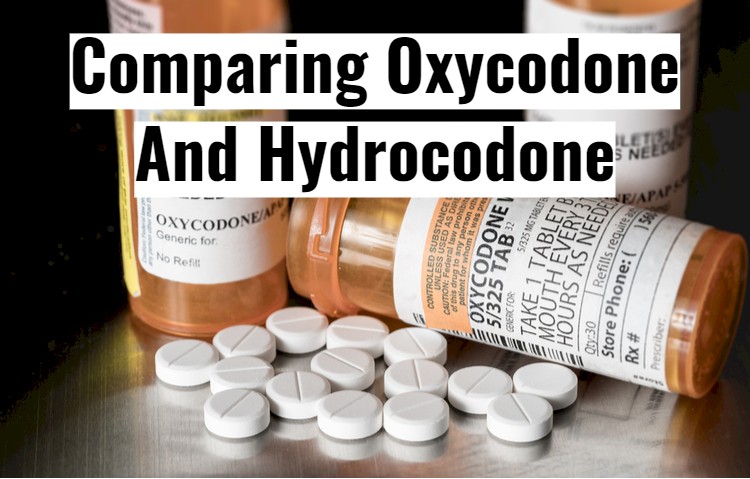Miranda asked
I'm prescribed 10mg Percocet a day, to take twice a day for lower back problems. I can't refill my medicine due to the holiday but I have a prescription of hydrocodone 7.5 mg that was left over from some dental work about 8 or 9 months ago. Is it okay to take one Percocet and 4 to 6 hours later take the hydrocodone?
At a glance
- Hydrocodone and oxycodone are both semisynthetic opioid drugs, but oxycodone is more potent (1.5 times stronger on a mg-mg basis). They should not be substituted with one another unless directed by your doctor.
Answer

I can compare the analgesic (i.e. pain-relieving) potency of hydrocodone and oxycodone (one of the active ingredients in Percocet) for you but I certainly wouldn't recommend substituting an old prescription of hydrocodone to replace your Percocet (oxycodone; acetaminophen).
First and foremost, you shouldn't take a prescription for a condition for which it has not been prescribed.
Even though hydrocodone and oxycodone are similar, they were prescribed by different doctors (one being your dentist) for the treatment of different conditions.
You could be putting your relationship with one or both doctors in jeopardy by taking a prescription (especially a Schedule II controlled substance) in a manner different from which it was prescribed.
Although individuals are often switched on opioids (like hydrocodone and oxycodone), you should be evaluated prior to doing so since several factors (e.g. patient-specific metabolism, organ function, etc...) can alter your response to them.
If you do end up taking the old hydrocodone, and you find you still need the Percocet, you could find your treatment delayed if your doctor is unwilling to refill it for you.
Ideally, you should contact your doctor, on-call service, or go to an emergency room for appropriate treatment. They also may be able to direct you to a 24-hour pharmacy for your prescription.
Having said all of the above, I will compare hydrocodone and oxycodone in the next section.
Hydrocodone Vs. Oxycodone

Hydrocodone and oxycodone are both 'semisynthetic' opioid agonists and are even classified in the same 'subclass' as each other (phenanthrene derivatives). Nevertheless, there are some significant differences between them.[1][2]
How They Work
Opioid agonists act on 'opioid' receptors in the body, which produces a number of effects including analgesia (pain-relief), altered emotional response and side effect such as respiratory depression and sedation.
There are a variety of opioid receptors he body including mu, delta, and kappa, and all opioid drugs affect them in one way or another.[3]
Hydrocodone and oxycodone are well-known to affect mu receptors, but oxycodone is thought to more strongly affect delta receptors than hydrocodone.[4]
The clinical significance of this isn't well known, but likely increases analgesic efficacy.
Pain-Relieving Potency
Oxycodone is considered to be a stronger opioid than hydrocodone is on a milligram to milligram basis.
Most guidelines on opioid treatments state that in terms of equivalent dosing, oxycodone is 1.5 times stronger than hydrocodone.[5]
So, for example, 20 mg of oxycodone would be around the same potency (equianalgesic dose) as 30 mg of hydrocodone.
Overall though, most studies show that they offer very similar analgesic efficacy for a range of conditions, such as musculoskeletal pain. Additionally, side effects are similar too, but oxycodone may produce less constipation.[6]
Metabolism
Oxycodone is metabolized to several metabolites, including:[7]
- Noroxycodone
- Noroxymorphone
- Oxymorphone
The majority of analgesics effect is from the parent compound, oxycodone. Although the metabolites do have some analgesic effects, they are only present in low concentrations and not thought to be overly significant.
Hydrocodone is metabolized to norhydrocodone and hydromorphone in the body.
The hydromorphone metabolite has analgesic effects, perhaps more-so than when produced from oxycodone metabolism.[8]
Genetic tests have shown that individuals who metabolize hydrocodone more or less quickly via a CYP2D6 enzyme mutation, could have an altered response to the drug.[9]
Final Words
Oxycodone and hydrocodone are similar opioids drugs but shouldn't be interchanged without direction from your doctor.
Not only do they have subtle pharmacologic differences, but taking one or the other for a condition for which they haven't been prescribed can be dangerous and you could be putting the relationship with your doctor on the line.
References
- ^ Elsevier ClinicalKey: Hydrocodone Monograph. ClinicalKey
- ^ Elsevier ClinicalKey: Oxycodone Monograph. ClinicalKey
- ^ Current Research on Opioid Receptor Function. PubMed
- ^ Oxycodone: a pharmacological and clinical review. PubMed
- ^ Pharmacological Profiles and Opioid Conversion Tables. PubMed
- ^ Comparison of oxycodone and hydrocodone for the treatment of acute pain associated with fractures: a double-blind, randomized, controlled trial. PubMed
- ^ Pharmacological Profiles and Opioid Conversion Tables. PubMed
- ^ Preclinical and Clinical Pharmacology of Hydrocodone for Chronic Pain: A Mini Review. PubMed
- ^ Individualized Hydrocodone Therapy Based on Phenotype, Pharmacogenetics, and Pharmacokinetic Dosing. PubMed




